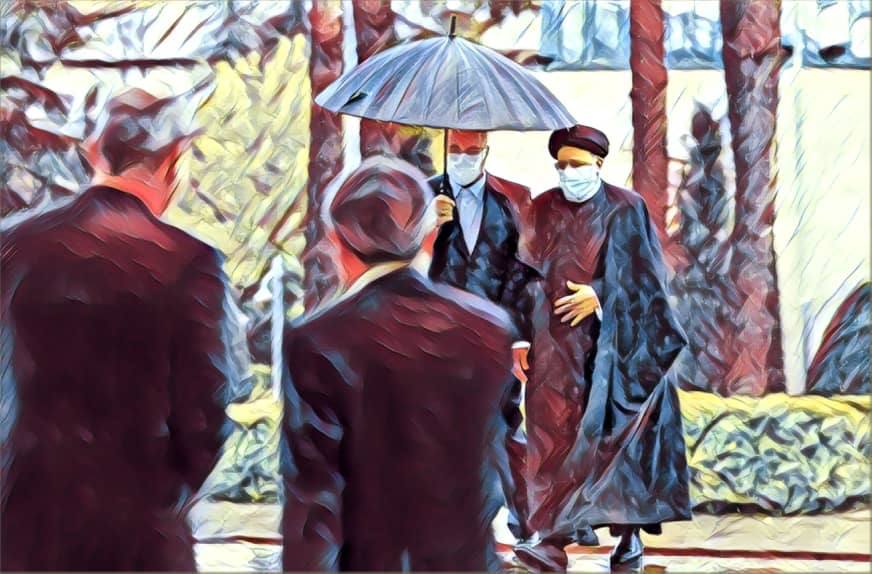The Battle Between Raisi and Qalibaf Intensifies
As reported by Iran Gate, as we get closer to the parliamentary elections, we are witnessing intensifying conflicts between the government and parliament in domestic media. Many believe this conflict stems from the challenging relationship between Ebrahim Raisi and Mohammad Bagher Qalibaf, which has not reached a relative calm since the 2013 presidential election.
The dismissal of Mohammad Reza Gholamreza, the political deputy of the Minister of Interior and also the head of the country’s election headquarters, has once again intensified discussions about the conflicts between the executive and legislative branches. This dismissal, which was carried out under pressure from representatives on Ahmad Vahidi, the Minister of Interior in Ebrahim Raisi’s government, was against the wishes of the thirteenth government. Many believe this conflict is a turning point in the file of disputes between the thirteenth government and the eleventh parliament, which could lead to an all-out war between these two branches. A war that is essentially between two important and well-known political figures in the country, who coincidentally are today at the head of the country’s executive and legislative branches.
Iran Gate, in a two-part series, has explored the roots of this crisis and intends to explain and clarify the file of conflicts and the battle between Raisi and Qalibaf.
Conflict from Day One
The issues and conflicts between Ebrahim Raisi’s government and the eleventh parliament led by Mohammad Bagher Qalibaf started from the very day the government went to the parliament to obtain a vote of confidence. Although the government managed to secure a vote of confidence for all ministers except one in an unprecedented move, noticeable traces of conflict were evident in those confidence vote sessions.
However, subsequently, the representatives took a confrontational stance with Raisi’s government in other cases including the 1401 budget, impeachment of ministers such as those of Industry, Economy, Sports and Youth, Roads and Urban Development. Additionally, the performance of the Stock Exchange Organization, Central Bank, private banks, and the Administrative and Recruitment Organization were among other contentious issues between the current parliamentarians and the residents of the executive branch.
Ministry of Interior: The Peak of Conflict
However, as mentioned at the beginning of this report, the peak of conflicts between Raisi and Qalibaf was related to the election law file that had been sent by the Ministry of Interior to the parliament. As a result, many representatives, concerned about being re-elected to the parliamentary seat, raised their opposition against the political deputy of the Minister of Interior. The situation escalated to the point where representatives were even collecting signatures for the impeachment of the Minister of Interior, but Qalibaf and the parliamentary presidium refrained from acknowledging it.
Reports indicate that Ahmad Vahidi has been trying to persuade Mohammad Reza Gholamreza, his former political deputy, but apparently, Gholamreza refused to accept this issue and insisted that he would not leave his managerial position in the Ministry of Interior under any circumstances. Therefore, in the second half of August 2023, Ahmad Vahidi was forced to dismiss his deputy to appease the parliamentarians. This decision by the Minister of Interior in Raisi’s government had repercussions, including Gholamreza issuing a statement indicating broader conflicts between the government and parliament than initially perceived.
On the other hand, it is said that the government was trying to ensure that its opposing representatives would not be present in the twelfth term of the Islamic Consultative Assembly in the parliament. Mohammad Reza Gholamreza was also chosen as the deputy of the Minister of Interior to implement policies aimed at purifying the parliament in favor of the ruling faction in the executive branch.
Who is Gholamreza
Mohammad Reza Gholamreza served as the political deputy of the Minister of Interior in Ebrahim Raisi’s government for approximately thirteen months, from July 2022 until he was dismissed on August 22, 2023, by a direct order from Ahmad Vahidi, the Minister of Interior in the thirteenth government.
There are reports that Ahmad Vahidi repeatedly asked Gholamreza directly to resign from his position quietly and without controversy, but the former deputy of the Minister of Interior not only refused this request from his superior but also reacted sharply, accusing Raisi and Vahidi of collusion and fear of Qalibaf. The statement released by this member of the Islamic Revolutionary Guard Corps after his dismissal also confirms that Gholamreza’s removal from his previous job did not happen without controversy and in a calm environment.
Vahidi, who had appointed Gholamreza as the head of the election headquarters for holding the twelfth term of the Islamic Consultative Assembly and the sixth term of the Assembly of Experts in May of the previous year, now had to dismiss this military figure. However, it now seems that Ebrahim Raisi’s government is facing difficulties in more intensely and extensively purifying the parliament than what was witnessed in 2019 and then in 2020.
The reason for this problem is the opposition of representatives who are not only trying to secure their share of support for Raisi but are also seeking to solidify their position in the parliament. But has the government lost in these struggles and did the revolutionary parliament emerge victorious? The next part of this two-part series will address the future relationship between Raisi and Qalibaf.
Qalibaf Enters the Scene
English
View this article in English

